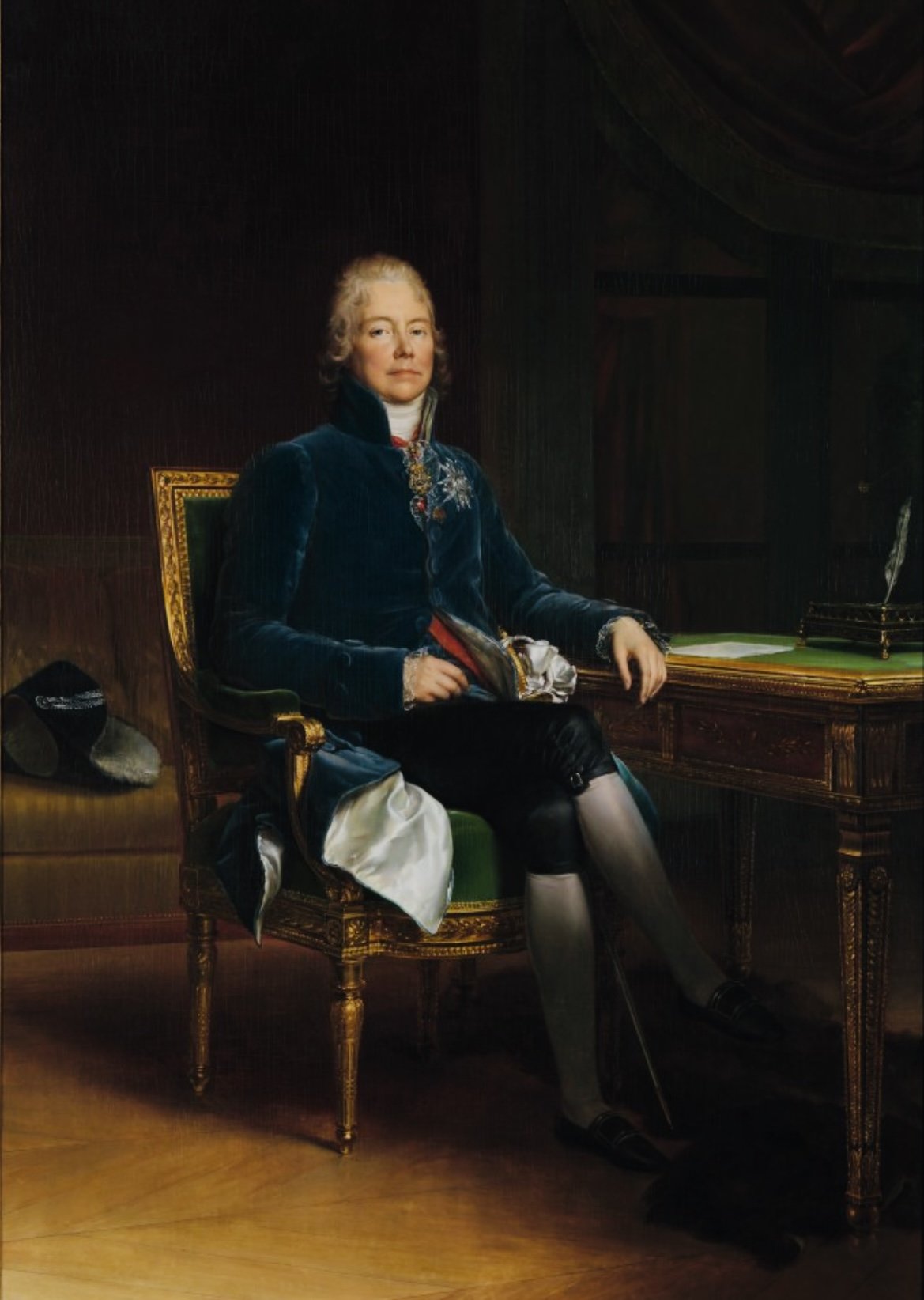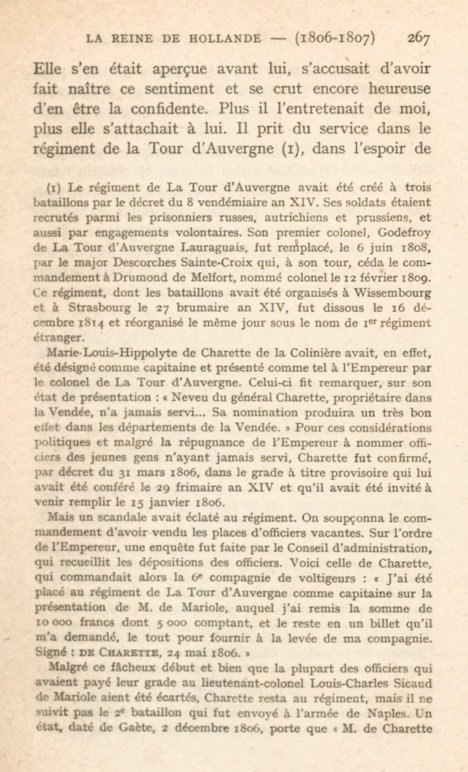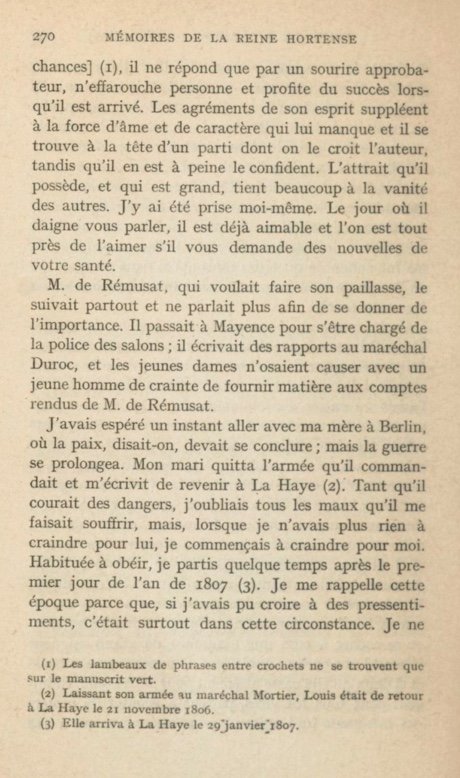Let’s have another look at Hortense’s Memoirs. If you want to read the book it is available for free at the side bar in English and French. Use the widget on the sidebar to translate the text below into pretty much any language.
In this excerpt, we see an interesting description of infiltrator types who are attracted to power wherever they can find it.
Hortense’s memoirs continues:
Meanwhile Monsieur de La Bedoyère left to join the army. When he said good-bye to me he was obviously moved. His generally severe manner made his emotion all the more apparent. About this same time there arrived at Mayence a young man at the point of death.
How sad I felt when I discovered that this, too, was my fault. I heard about it through Mademoiselle Cochelet. When in Paris, she often met at the house of one of her mother's friends a Monsieur de Charette de la Colinière, nephew of the famous Charette de la Vendée. He had heard Mademoiselle Cochelet's complimentary remarks about me and listened with interest, making her describe the sorrows of my home-life, of which she was so frequent a witness.
She herself had been strongly attracted by this young man, so gifted in mind and so handsome in person that few women dared to go about with him for fear of being stared at.
Since the subject interested him, she talked frequently of me in order to secure his attention. He never saw me except in the ballroom and never spoke to me, but finally his imagination was fired by hearing me praised so often, and he declared that he loved me.
Mademoiselle Cochelet instead of being jealous considered his feelings quite natural. She had been aware of his sentiments before he knew them himself, felt responsible for having aroused them, and was happy to have them confided to her. The more he talked about me, the more she cared for him.
He enlisted in the regiment of La Tour d'Auvergne in the hope of being nearer to me, left it when I went to Holland, and under cover of a pleasure trip through that country came there for the purpose of catching a glimpse of me.
He arrived the very day I was leaving for Wiesbaden. The fatigue of the journey and grief at my departure affected his health, which was already delicate. He broke a blood vessel in his chest, returned to Paris spitting blood, but instead of taking care of himself came back to Mayence to take part in the campaign.
When he arrived there, he was too feeble to go any farther. Mademoiselle Cochelet was overcome with grief to have been the cause of such a tragedy and told me everything. Although I reproached her for having talked so much about me, the harm had been done. I asked her, nevertheless, to say as many disagreeable things regarding me as she had previously said flattering ones.
Mademoiselle Cochelet begged me out of kindness to receive Monsieur de la Charette just once in order to persuade him to return to his family. I did so. I pretended to know nothing about his sentiments towards me and talked entirely about how much Mademoiselle Cochelet cared for him. He showed that he appreciated what she did for him and before he left, he ceased to speak of me and asked her to become his wife. His death put an end to this plan.
I only heard of it several months later at a time when the intensity of my own grief prevented me from being greatly affected by the news. It was during this journey that I became better acquainted with Monsieur de Talleyrand. I had often wondered how people could praise his wit and consider him so clever when he so rarely displayed those qualities.
For years I had watched him enter the drawing-room of Malmaison with his careless and distant air. He dragged along his clubfoot, leaned against the first chair he encountered, and barely bowed to the people present.
He hardly ever spoke to me. At Mayence, (on the other hand) he sought my company and took the trouble to make himself agreeable. I was surprised and even flattered. The attentions of a man who is generally aloof make a special impression.
I am convinced that Monsieur de Talleyrand's reputation for cleverness, which I admit he deserves, is less the result of anything remarkable that he does than of the little he says, but says so well.
He is chiefly remarkable for his epigrams, his perfect tact, his great skill in discovering the reasons for other people's actions and concealing his own motives, the self-confidence of a great lord and a natural tolerant indolence, which makes him so easy and agreeable to get on with that people consider it a sign of kindness of heart.
He is indulgent toward all forms of vice, and is willing to listen patiently to plans of schemers, especially if their projects have any chance of success. His only comment on what he is told is an approving smile, and he takes care to alarm no one and to exploit success by whomever it has been achieved.
The attractive quality of his mind makes up for his lack of moral strength, and he finds himself at the head of a movement which people think he organized when in reality he was hardly even the confidant of those who really started it.
His very reputation for possessing great charm, although founded on fact, is largely due to the vanity of those with whom he comes in contact. I myself succumbed to it. The day he condescends to speak to you you are conquered by the fact that he does so, and you are quite prepared to adore him if he merely asks after your health.
Monsieur de Remusat, who trimmed his sails to every breeze, followed Monsieur de Talleyrand about and, imitating his model, no longer said a word in the hope that by adopting this pose he might make himself seem important.
At Mayence he was said to keep the police informed of what went on in society. He sent reports to Marshal Duroc, and the young ladies did not dare to be seen chatting with young men for fear of providing material for the reports of Monsieur de Remusat.
I had hoped for an instant to go to Berlin with my mother for the signing of the peace, but the war kept on. My husband left the army of which he was in command and wrote me to return to the Hague. As long as he was in danger, I forgot all the harm he had done me, but when I no longer had any reason to feel alarmed on his account, I began to fear for myself.
Being accustomed to obey I left Mayence shortly after New Year's Day, 1807. I remember the date because if I had been inclined to believe in premonitions, I should have had good reason to be alarmed just then.
Every time anyone wished me Happy New Year tears came to my eyes. My present distress was enough to dampen my spirits, and besides that, I was about to leave my mother without knowing when I should see her again. I was returning to a foreign land where no one knew me, where there was no one to protect me. And from whom did I need to be protected? From my husband. In addition to all this, I foresaw, I do not know why, still more trouble in the near future. I was frightened at my state of mind. "What is going to happen to me this year?" I asked Adele when I found myself alone with her.
“What can be worse than what you endure?" she replied.
“Have you not enough reason to be unhappy without inventing imaginary ones?" Her common sense impressed me, but sometimes a painful mood continues without any good ground for it.
The original French is available below:











